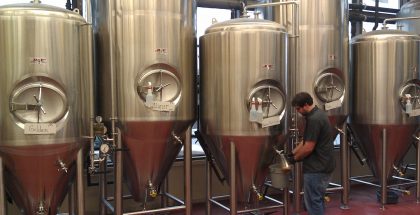Proposed Laws Could Change Craft Beer In Florida, Georgia, Kentucky and Texas
If you’re reading PorchDrinking.com, then you’re likely well aware the craft beer industry is killing it in the U.S. The Brewers Association says the industry hit $19.6 Billion in retail and took hold of 11 percent of the volume share in 2014 — the first double digit share ever.
While the success stories are widely reported and cheered, including West Virginia’s legislature passing a law earlier this month to allow state breweries to offer samples, lawmakers in several states are right now debating proposals that could significantly impact how beer-loving residents and visitors legally consume and buy craft beer. While there are smaller legal issues around the nation, the heated debates in Florida, Georgia, Kentucky and Texas are the ones we’re watching very closely right now. Here’s why.
Florida
Florida SB 186 aims to allow the sale of 64 oz. growlers, the size that’s fairly popular industry-wide. Right now, growlers are legal in the small 32 oz. size, which is about two beers worth, and the gigantic gallon size, which is almost too much to make buying a growler worth it, since you’d need quite a few friends to help you finish it the same day you open it (which is the best way to consume growlers). SB 186 is sponsored by Sen. Jack Latvala, who attempted to get a similar law through during the 2014 session, but it was eventually killed, the Tampa Bay Times reports.
Although the 64 oz. growler size is the primary consumer-focused side of the bill, SB 186 also holds wording that seeks to clear how Florida’s 65-plus breweries do business. Earlier this year, a lawsuit filed by the Florida Retail Federation against the Department of Business and Professional Regulation sent a jolt through the brewing community, originally fearing taprooms — which are a crucial part of growth for the state’s small breweries — were under attack.
While Florida has a three-tier system, which means beer goes from brewery (tier 1) to distributor (tier 2) to you (tier 3), WFSU explains many breweries have been legally operating tasting rooms under a tourism exception — a practice that was first started in the 1980s when Anheuser-Busch wanted a tasting room at Busch Gardens theme park.
“We’re so happy that craft brewers are in Florida, but we just want them to do it under the right classification,” Rick McAllister, the president and CEO of the Florida Retail Federation told the Ft. Myers News Press. “All we’re asking for are for rules that can be read, understood and applied.”
While hearings started in Tallahassee over that very issue, Sen. Latvala’s proposal includes language which would “give clarification to that issue,” he told WFSU.
- Find Your Florida State Representative or State Senator
- Florida Brewers Guild Statement on the Lawsuit
Georgia
The Beer Jobs Bill, technically called Georgia SB 63, aims to blow the doors off the state’s archaic beer laws. Georgia, like Florida, operates under a three-tier system, which means beer must go from breweries, through distributors, to get to you. But unlike Florida, there are no tourism exceptions or any other statute that would allow working outside that strict system. Right now, you cannot buy a beer at a brewery; you pay for the tasting glass and the tour, while the beer samples of no more than a combined 32 oz. are considered “free.” That means you can essentially walk into a Georgia brewery with your own small tasting cup and sample for free. It’s a jerk move, but it’s legal. You also cannot buy a growler from a brewery or from a brew pub.
The laws not only hamstring consumers who want to support breweries by purchasing more of the product, but the laws mean Georgia ranks 47th out of 50 states in breweries per capita, according to the Georgia Craft Brewers Guild.
“Georgia is only one of five states left where a brewery cannot sell beer directly to consumers, making our state one of the lowest in the country in terms of economic impact from jobs in the craft beer industry,” according to SB 63 sponsor Sen. Hunter Hill.
SB 63, in its original form, was meant to allow the sale of beer straight from breweries, as well as allow take-home growlers from brew pubs, much in the same way people can legally sample and purchase wine from Georgia wineries. But before the Georgia Senate passed the bill, it made amendments that stripped away much of the heart of the legislation that would have allowed consumers to buy beer straight from breweries, which would, in the end, increase jobs and the economic value of the industry. The bill hits the House next, and the Georgia Craft Brewers Guild is asking representatives to fix the Senate’s reworked bill, which GCBG said “is riddled with mistakes, [and] bad public policy.” The GCBG continues to encourage beer lovers to reach out to their state senators via phone or email. Breweries also banded together to create a calendar that puts brewers in “compromising,” yet hilarious, positions in order to raise money toward the fight.
- Find Your Georgia State Senators
- Sign the Petition to Save Georgia Beer
Kentucky
The fight in Kentucky is over distribution. Supporters of Kentucky House Bill 168 say it aims to “close a loophole” that has allowed Anheuser-Busch to both make beer in the state as well as distribute it there. The call for change came after a court battle last year over whether the beer giant could acquire a smaller distributor in Owensboro, Louisville’s Courier-Journal reports; Anheuser-Busch has owned another distributor in Louisville since 1978.
Damon Williams, a spokesperson for Anheuser-Busch, told the Lexington Herald-Leader, “The beer distribution system in Kentucky is working fine. The notion that our ownership here stifles the craft guys is just plain wrong.”
Anheuser-Busch released a fact sheet where it contends Kentucky’s beer industry is strong as is, and that the bill would actually put about 200 of its own employees out of a job.
In the flip side, the Kentucky Brewers Guild is “pleased” with HB 168, saying it would ensure “the environment in the state stays competitive and that all brewers, regardless of size or location, are set on an even playing field.”
But not all small brewers agree. Bob Bonder and Bryant Goulding, who own Rhinegeist Brewing and Riverghost Distribution in southern Ohio and Kentucky, said the pending legislation has already stunted the growth of their burgeoning distribution business.
“As owners of a craft brewery that self-distributes in the state of Ohio, we are uniquely positioned to represent other craft breweries in Kentucky. We know the product intimately. We recognize the concerns of the brewers and small business owners because we live with those same concerns every day,” the pair wrote in an editorial featured on Cinncinnati.com.
- Find Your Kentucky State Legislators
- Kentucky Brewers Guild Statement on HB 168
Texas
During the last legislative session, Texas brewers won legal permission to sell straight to the consumer. The Texas Craft Brewers Guild said the legislation allowed breweries in the state to increase production by a whopping 44 percent, increasing its economic impact well above $2 billion, according to a recent news release.
This year, partner bills in the House (House Bill 3086) and Senate (Senate Bill 1386) aim to break down the final wall: allowing breweries to sell as much as two cases worth of take-home beer each month, in the form of cans, growlers or bottles.
“Texas craft brewers continue to bring economic growth, jobs and national recognition to the state,” according to Texas State Senator Kevin Eltife, who is sponsoring the bill. “This legislation is designed to finish what we started last session and bring people from around the country to this state, which is rapidly becoming the epicenter of craft brewing quality.”
A separate piece of legislation, filed in mid-March, aims to cramp Texas’ smallest breweries all together. According to the Dallas Observer, state Rep. Senfronia Thompson proposed House Bill 3389, which would drastically limit how much small breweries can self-distribute, lowering the amount from the current 40,000 barrels a year to a meager 5,000 barrels a year. But as Houstonia mag reports, Thompson has received thousands in contributions from distributor advocates since at least 1998. And as the Dallas Morning News’ Rudolph Bush writes in a recent editorial, “I give Thompson’s bill low odds at best.”
- Find Your Texas State Legislators
Editor’s Note: Special thanks to CQ’s StateReport for additional research support.
-
Interesting article!
It would be interesting to understand exactly what implications the KY bill would have for craft brewers. What role do distributors have and how would preventing AB from distributing and making beer change that? Also, the linked article suggests that KY also follows the 3-tier system, but I know that several small breweries in KY make beer that they sell in-house (e.g. BBC, Cumberland, West Sixth, etc.). How does that work?
Just a heads up that the Courier-Journal is a Louisville newspaper and not a Lexington one. I believe the newspaper in Lexington is called the Herald-Leader. Sorry to be that guy.








Comments